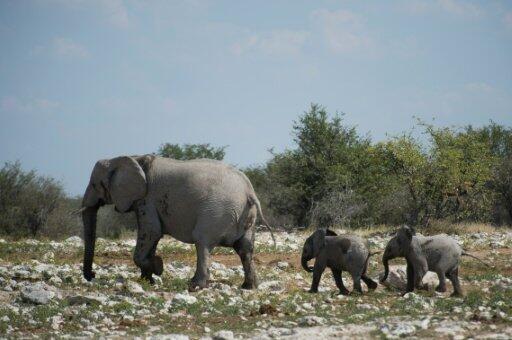Southern African countries will Monday fight for permission to sell their ivory stockpiles, as an international wildlife conference debates how best to regulate the often illegal trade and protect Africa’s elephants.
Targeted for their tusks, the continent’s pachyderms have been decimated by poaching, with a new study showing the number of African elephants has fallen by around 111,000 in the past decade — the worst drop in 25 years.
How to help, including whether to tighten or ease control over the ivory trade, has been one of the most contentious topics at the ongoing meeting of the Convention on International Trade in Endangered Species (CITES) in Johannesburg.
A coalition of 29 African countries is pressing for African elephants to be given an Annex 1 CITES listing, which would totally ban all trade in ivory, but other delegates believe this would only fuel the booming illegal market.
International trade in ivory has been banned since 1989, but legal domestic markets have continued in some countries around the world, and CITES has twice allowed sales of African ivory stockpiles to Japan and China, in 1999 and 2008.
Namibia and Zimbabwe — which boast healthy elephant populations — have asked for permission to sell off stockpiles accrued from natural deaths to fund community elephant conservation initiatives.
But the coalition is calling for more stringent controls, and delegates at the weeked adopted a recommendation aimed at clamping down on domestic ivory markets “contributing to poaching or illegal trade”.
A two-thirds majority vote is required to pass either motion.
The European Union has indicated it “will support a continuation of the ban on international trade in ivory”.
Thousands of conservationists and government officials have spent the last week thrashing out international trade regulations aimed at protecting different species of animals and plants.
Last week, Namibia, Zimbabwe, South Africa and Zambia lashed out at Western-based animal charities who they said “dictated” how African resources should be managed.
“CITES should be there to facilitate us to suceeed in our conservation programmes rather than these imperialistic policies and decisions that are being made,” Zimbabwe environment minister Oppah Muchinguri said.
“We have our sovereign right and we know best what to do, how to utilise our natural resources.”
She said the proposal “to close domestic markets for ivory trade … is a clear infringement on the sovereign rights of nations”.
The CITES treaty, signed by 182 countries and the European Union, protects about 5,600 animal and 30,000 plant species from over-exploitation through commercial trade.
The 12-day conference, which ends on Wednesday, is sifting through 62 proposals to tighten or loosen trade restrictions on around 500 species.
Source: AFP











